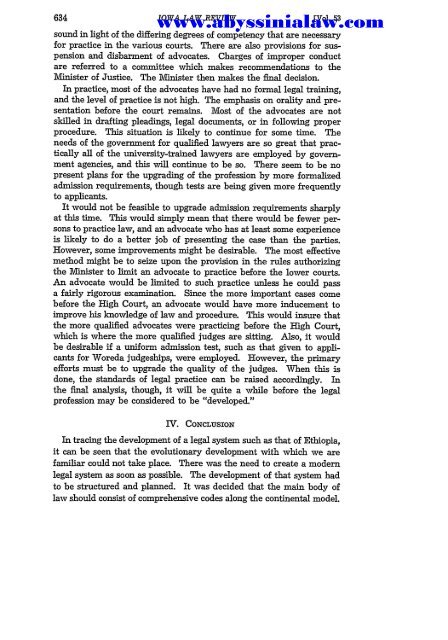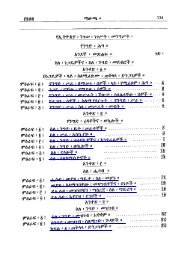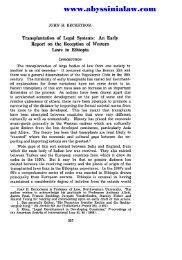You also want an ePaper? Increase the reach of your titles
YUMPU automatically turns print PDFs into web optimized ePapers that Google loves.
IOWA LAW REVIEW<br />
[Vol. 53<br />
www.abyssinialaw.com<br />
sound in light of the differing degrees of competency that are necessary<br />
for practice in the various courts. There are also provisions for suspension<br />
and disbarment of advocates. Charges of improper conduct<br />
are referred to a committee which makes recommendations to the<br />
Minister of Justice. The Minister then makes the final decision.<br />
In practice, most of the advocates have had no formal legal training,<br />
and the level of practice is not high. The emphasis on orality and presentation<br />
before the court remains. Most of the advocates are not<br />
skilled in drafting pleadings, legal documents, or in following proper<br />
procedure. This situation is likely to continue for some time. The<br />
needs of the government for qualified lawyers are so great that practically<br />
all of the university-trained lawyers are employed by government<br />
agencies, and this will continue to be so. There seem to be no<br />
present plans for the upgrading of the profession by more formalized<br />
admission requirements, though tests are being given more frequently<br />
to applicants.<br />
It would not be feasible to upgrade admission requirements sharply<br />
at this time. This would simply mean that there would be fewer persons<br />
to practice law, and an advocate who has at least some experience<br />
is likely to do a better job of presenting the case than the parties.<br />
However, some improvements might be desirable. The most effective<br />
method might be to seize upon the provision in the rules authorizing<br />
the Minister to limit an advocate to practice before the lower courts.<br />
An advocate would be limited to such practice unless he could pass<br />
a fairly rigorous examination. Since the more important cases come<br />
before the High Court, an advocate would have more inducement to<br />
improve his knowledge of law and procedure. This would insure that<br />
the more qualified advocates were practicing before the High Court,<br />
which is where the more qualified judges are sitting. Also, it would<br />
be desirable if a uniform admission test, such as that given to applicants<br />
for Woreda judgeships, were employed. However, the primary<br />
efforts must be to upgrade the quality of the judges. When this is<br />
done, the standards of legal practice can be raised accordingly. In<br />
the final analysis, though, it will be quite a while before the legal<br />
profession may be considered to be "developed."<br />
IV. CONCLUSION<br />
In tracing the development of a legal system such as that of Ethiopia,<br />
it can be seen that the evolutionary development with which we are<br />
familiar could not take place. There was the need to create a modern<br />
legal system as soon as possible. The development of that system had<br />
to be structured and planned. It was decided that the main body of<br />
law should consist of comprehensive codes along the continental model.





